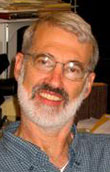Psychology professor Robert Elliott Johnston dies at 72
By Linda B. Glaser

Robert Elliott Johnston, professor of psychology, died Dec. 20 at Cayuga Medical Center in Ithaca after extended treatments for lymphoma. He was 72.
“Bob was a wonderful and calm colleague, steadily productive in his research at Cornell for over 40 years, who roamed our hallways as a looming and beneficent presence (he was more than a head taller than most of us). He will be missed,” said James Cutting, the Susan Linn Sage Professor and chair of the Department of Psychology in the College of Arts and Sciences.
Johnston researched animal behavior and the mechanisms of behavior in a naturalistic or evolutionary context. He studied social behavior, such as scent marking, aggression, sexual behavior, individual recognition and kin recognition, to gain a greater understanding of animal behavior.
He observed animals in their natural habitats in the Republic of Dagestan, Africa, South America, China and Australia. Connections with German and Turkish researchers led to his studying wild hamsters in Turkey.
“He realized that both memory and communication are critical to social interactions, in animals as well as in ourselves,” said psychology professor Timothy DeVoogd. “Bob’s major discoveries were that even hamsters have and use these abilities – but do so using smell. They create a variety of scents and perceive these both with a regular olfactory system and one that is specialized for pheromones. … Bob was intrigued with how evolution has modified these abilities in different species.”
The courses he taught at Cornell included the Evolution of Human Behavior, and Olfaction, Pheromones and Behavior, a seminar course on communication by odors in animals and humans, the sense of smell, and the neural mechanisms of olfactory communication. He also periodically organized biopsychology discussion groups that addressed new techniques and research in the field. He was a mentor to many postdocs, graduate students and undergraduates.
In addition to his scientific interests, Johnston enjoyed squash, cross-country skiing, ice skating, hiking and dancing. He was also a talented artist in many media, including sculpture and oil painting; he used his extensive photographs of nature as the subject matter of his work.
“His dream was to spend time after retirement studying social interactions in the wild in novel species,” said DeVoogd.
Johnston graduated from Dartmouth with a bachelor’s degree in psychology in 1964 and received a doctorate in behavioral and neural sciences from Rockefeller University in 1970, after which he joined the psychology department at Cornell.
He is survived by his wife, Joan; two sons; and his brother, sister and uncle.
A memorial service will be announced at a later date.
Linda B. Glaser is a staff writer for the College of Arts and Sciences.
Get Cornell news delivered right to your inbox.
Subscribe